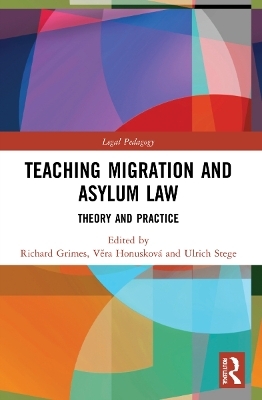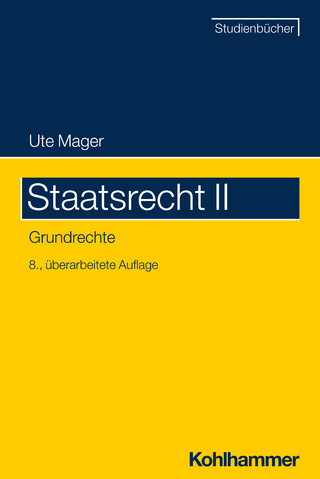
Teaching Migration and Asylum Law
Routledge (Verlag)
978-0-367-76579-8 (ISBN)
This highly topical book demonstrates the theoretical and practical importance of the study of migration law. It outlines approaches that may be taken in the design, delivery and monitoring of this study in law schools and universities to ensure an optimum level of learning.
Drawing on examples of best practice from around the world, this book uses a theoretical framework and examples from real clients to simulations to help promote the learning and teaching of the law affecting migrants. It showcases contributions from over 30 academics and practitioners experienced in asylum and immigration law and helps to unpick how to teach the complex international laws and procedures relating to migration between different countries and regions. The various sections of the book explore educational best practice, what content can be covered, models for teaching and learning, strategies to deal with challenges and ways forward.
The book will appeal to scholars, researchers and practitioners of migration and asylum law, those teaching migration law electives and involved in curriculum design, as well as students of international, common and civil law.
Richard Grimes is a Solicitor who has specialised in publicly funded and pro bono cases. He is currently a Visiting Professor at Charles University, Prague, Czech Republic and at Edinburgh Law School, Scotland. He has devoted his time to developing experiential learning in universities - at home and abroad - and has published widely on the design, delivery and evaluation of legal education. Věra Honusková is a Senior Lecturer in International Law at the Faculty of Law, Charles University, Prague, Czech Republic where she specializes in migration and refugee law. She has published extensively in this and related fields and has established a program developing students’ knowledge, legal skills and ethical and professional values in the field of migration and refugee law using a variety of teaching methods. Ulrich Stege is Director of the Clinical Legal Education Programme at the International University College of Turin, Italy. In addition to his role at the IUC, he is a practicing lawyer and member of the Italian and German bars, mainly in the field of migration and asylum. He has been active in promoting clinical legal education in Europe and abroad.
1. The theory behind (more) effective learning and teaching. Part 2: What to teach: content and subject. 2.Creating a Refugee Law Reader: from a teaching tool to a handbook. 3. Public interest lawyering and cosmopolitanism: a model for teaching immigration law. 4.Therapeutic jurisprudence in an asylum and refugee family reunion clinic. 5. Exploring migration and migrants’ rights in clinical legal education: two case studies. 6. An overview of the teaching of Refugee Law at the University of Cape Town, Law Faculty. 7. Developing student research skills in migration clinics. Part 3: How to teach: teaching and learning models. Section A – Working with real clients. 8. Learning and teaching immigration law through experience: law school clinical programs. 9. Developing a regional service for asylum seekers. 10. Teaching clinic within a practice of injustice: what clinical legal education with asylum-seekers can teach Australian students about inequity. 11. Meeting the needs of clients and students - two Australian case studies: Flinders Migration Clinic, and Refugee and Immigration Legal Service. 12. Clinical Legal Education within the European-Mediterranean asylum and migration context – inside views from Valencia and Turin. 13. Clinical legal education and migration: challenges in the academy. 14. The StrEEt Aware Law Clinic – EU Settlement Scheme Law Clinic at the University of Edinburgh. Section B – Using simulation and other approaches. 15. Simulated role play: bridging the ‘knowing/doing gap’ in refugee law and policy. 16. Using Live Action Role-Play in teaching migration and refugee law. 17. Teaching refugee law through moot courts. 18. Theoretical foundations of gaming in teaching the functioning and future of European Migration- let’s play! 19.Using real-life cases as a basis for learning: experiences from Amsterdam and Zagreb. 20. Studying online: the opportunities and challenges for the teaching of migration law. Part 4: Challenges, strategies and ways forward. 21.On building a boat (or, learning how not to teach refugee law). 22. The clinic as a base for holistic study. 23The Migration Specialization programme: a laboratory for teaching migration and refugee law.
| Erscheinungsdatum | 28.09.2023 |
|---|---|
| Reihe/Serie | Legal Pedagogy |
| Verlagsort | London |
| Sprache | englisch |
| Maße | 156 x 234 mm |
| Gewicht | 453 g |
| Themenwelt | Recht / Steuern ► EU / Internationales Recht |
| Recht / Steuern ► Öffentliches Recht ► Verfassungsrecht | |
| Sozialwissenschaften ► Pädagogik ► Erwachsenenbildung | |
| Sozialwissenschaften ► Soziologie | |
| ISBN-10 | 0-367-76579-9 / 0367765799 |
| ISBN-13 | 978-0-367-76579-8 / 9780367765798 |
| Zustand | Neuware |
| Informationen gemäß Produktsicherheitsverordnung (GPSR) | |
| Haben Sie eine Frage zum Produkt? |
aus dem Bereich


